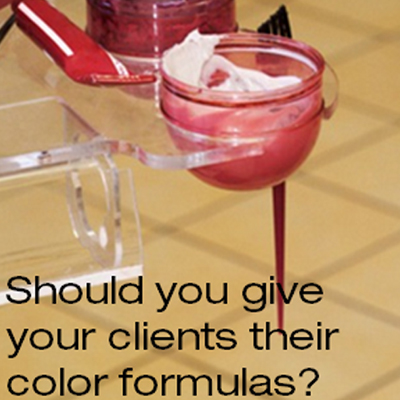Should You Give Your Clients Their Color Formulas?
A stylist in a color crunch recently reached out to the BTC community after she was approached by a client requesting her color formula so she could pass it along to a friend.
“I have a loyal haircut client who just called and wanted to schedule an appointment for color,” she wrote. “Exciting right?! Wrong! She explained that she wanted to be completely open and honest with me about it. She would like for me to write down “the number” (didn’t ask for a formula) I use on her so that she can give it to her friend. The goal is for her friend to do it from there on out. I am assuming this friend isn’t a professional, although I didn’t press for details because I was completely caught off guard. What would you do? Refuse the service? Refuse the info? If not, how detailed do you go into formulations? I agreed to color her, but I am going to warn her that if she uses a different (and non-professional) product, results aren’t guaranteed. With that being said, hope I can wow her enough to make her see it’s worth the extra money to have it done professionally!”
This sparked a lively debate among the BTC Community. On the one hand, stylists invest time and money in school, and work hard learning how to create custom colors for their clients—should they really just give them away? On the other hand, it’s important to be known as someone willing to go out of their way for a client—especially a loyal, long-term client—and holding up your reputation as a helpful stylist is important. So which is it? Here’s what you BTC-ers had to say.
Go Ahead and Give Her the Formula
Stephanie Horne Kirkman has been a stylist and colorist for 40 years, and has seen this scenario come up quite a few times. Her solution? “I will absolutely give a client their formula in the color line I use, and I have no problem with that,” she says. “If a client can’t pay for salon time for me to do it, I’m not actually losing money giving it to them, but keeping my reputation as a person they trust—and this usually pays off in the end. I’ll get them back as a regular, or they’ll send someone to me because I helped them out and they trust me.” Tasha Watkinson agrees. “I feel if they have been good clients in the past, but just can’t afford it anymore, you should give them their formula! People change and so does life—they don’t have to stay with you forever! If she has been a good client, give it to her!”
Not all BTC Members feel the same way, however. Some stylists even went so far as to say they would alter a client’s formula to ensure they wouldn’t be able to get the same color results anywhere else, and would ultimately have to return to their chair. But many BTC Members strongly disagreed with this opinion—urging fellow stylists to be honest with their clients.
“I know some stylists feel as though the formula that they came up with is their personal property,” says Lauren Falzett-Davis. “Well, I disagree. I feel it’s split property. The client paid you to come up with that formula to use on their hair. There could be many different reasons a client is asking for their formula. Maybe they lost their job and can no longer afford to have their hair colored, but need to continue to look nice for interviews. Who am I to stand in their way simply to line my own pocketbook? Being honest and helpful in life will get you much further than lying and deceiving ever will.”
Jeanie Cote sums up the sentiments of many BTC Members involved in the discussion. She states, “I would explain to her that I have created a custom cocktail for her. That I use two ‘numbers’ with three different tones. I would explain how application, timing, proper measuring and mixing are going to make a difference in her end result. I would give her extreme attention, fabulous results and assure her that I value her business. At the end I would graciously turn over the formula and remind her I am just a phone call away, even if just for a cut.” One of the most popular responses came from Mary Jane Pierce Sims, who articulates nicely what is likely to happen should you give your client her formula.
“1. Don’t lie and give the wrong formula.
2. Give her the number.
3. Enjoy fixing it when they come back!”
The Formula Is Yours—Keep It That Way!
Not everyone agrees with Mary Jane and Jeanie. Donna Jamison-Heffner, for example, believes that unless a client is moving out of town, you shouldn’t give her your formula. “I had to go to school to learn how to come up with that formula,” Donna says. “If Aunt Sally wants to do your hair, she can figure it out. Of course I say it in a nice, professional way. But no, the formula is mine.” Patrice Renee is a newly-licensed hairdresser, and she says she wouldn’t consider giving out formulas, either. “For one thing,” she says, “becoming trained in this field was an investment, and this would be like leaking out my secrets. Secondly, formulations often change as hair changes, lifestyles change…it may not require the same formulation the second time around.”
Mickey Long shares the same opinion. “If a guest decides they can no longer see me due to their budget, that is fine,” he notes. “However, it is not my job to ensure their satisfaction after that. I respect each of my guests and greatly appreciate their business, but when the money stops, so do I. This is my career. This is my livelihood. My first responsibility is to myself and my finances.”
Find the Right Words
So you’ve decided not to give your formula away, but you’re not sure what to say to your client. Now what? “I simply tell them that I custom blend the formula to suit their needs, and their friend will not be able to duplicate it,” says Laura K. Taking a different approach, Veronica James says, “I’d explain to her that you really appreciate her business, but she needs to understand that this is how you make your living.” Adding, “She’s not only paying for the service, but for your education and knowledge. People seem to forget that hairstylists don’t do this for fun—we need to make money too!”
Beth Meyer says she has also had this happen to her. “I politely told her that ‘I can’t do that,’ since professional color lines aren’t the same as non-professional lines, and she may end up with something she doesn’t want. I tell them because I care about the health of their hair…If they choose not to come back to me, well then so be it.”
Put a Price on It
One more option is this idea from Kirk Bishop. “We charge $35 to release a client’s formula and give them a release form that tells the client ahead of time that this formula is given only as a reference,” he notes. Kirk says to make sure the client agrees and understands that the salon is not responsible for the end result when not applied in the salon. He says so far, this system has worked well for him and his salon team.









